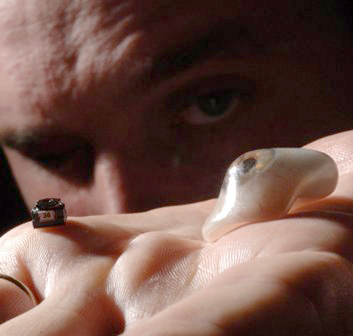 A Canadian filmmaker who is blind in one eye announced plans to have a mini-camera installed in his prosthetic eye in order to make documentaries (see article below and eyeborgblog.com). Interestingly, the camera was originally designed for colonoscopies.
A Canadian filmmaker who is blind in one eye announced plans to have a mini-camera installed in his prosthetic eye in order to make documentaries (see article below and eyeborgblog.com). Interestingly, the camera was originally designed for colonoscopies.
Sunglasses already are commercially available that will take still pictures of amazing quality with lenses that are virtually unnoticeable. Video and audio recording cannot be far behind. Combine with face recognition software and your contact file, and pretty soon a computerized voice will be whispering in your ear, “This is John Smith, he works for XYZ Co. You met him at a conference in Los Angeles three years ago.”
While that may be great for those of us with poor memories for names and faces, the loss of privacy is astounding and troubling.
Closing Quotes:
“Relying on the government to protect your privacy is like asking a Peeping Tom to install your window blinds.” — John Perry Barlow, American poet, essayist, retired Wyoming cattle rancher, political activist, and former lyricist for the Grateful Dead
“All violations of essential privacy are brutalizing.” — Katharine Fullerton Gerould, American writer
“Goethe said, ‘Talent is developed in privacy,’ you know? And it’s really true. There is a need for aloneness which I don’t think most people realize for an actor. It’s almost having certain kinds of secrets for yourself that you’ll let the whole world in on only for a moment, when you’re acting.” — Marilyn Monroe, American actress
—- Article —-
Filmmaker plans “Eyeborg” eye-socket camera
Thu Mar 5, 2009
Reporting by Bate Felix, Editing by Louise Ireland
Reuters News Service
BRUSSELS – A Canadian filmmaker plans to have a mini camera installed in his prosthetic eye to make documentaries and raise awareness about surveillance in society.
Rob Spence, 36, who lost an eye in an accident as a teen-ager, said his so-called Project Eyeborg is to have the camera, a battery and a wireless transmitter mounted on a tiny circuit board.
“Originally the whole idea was to do a documentary about surveillance. I thought I would become a sort of super hero … fighting for justice against surveillance,” Spence said.
“In Toronto there are 12,000 cameras. But the strange thing I discovered was that people don’t care about the surveillance cameras, they were more concerned about me and my secret camera eye because they feel that is a worse invasion of their privacy.”
Spence, in Brussels to appear at a media conference, said no part of the camera would be connected to his nerves or brain.
He does not intend to create a reality TV show and the camera will be switched off when not needed, he said.
“I don’t want to go into a locker room. I don’t want to show the world me going to the bathroom either … I’m not a life-caster and I don’t plan to be one,” he said.


0 Comments